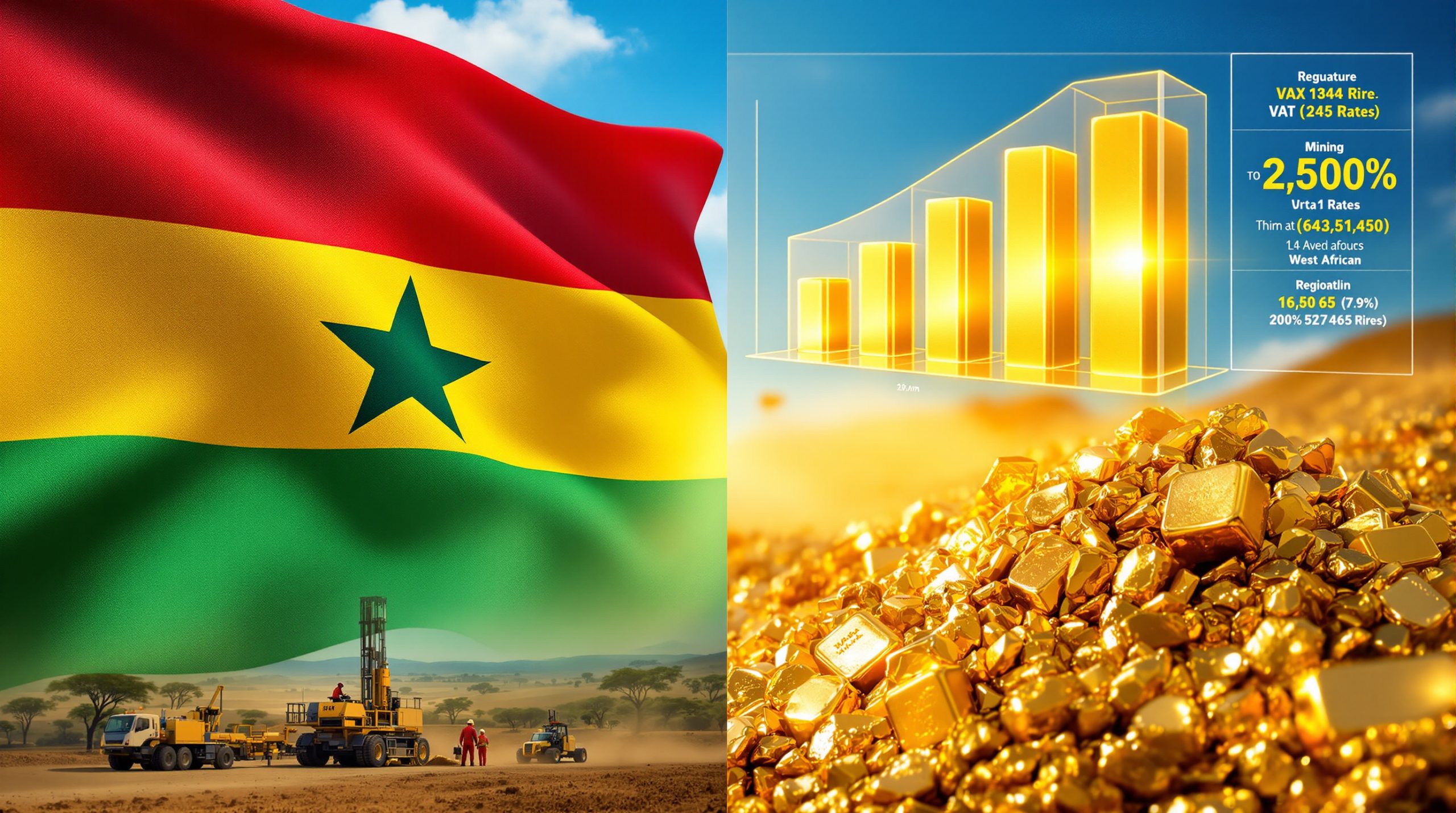Why Ghana's Mining Tax Elimination Marks a Strategic Shift
Ghana scraps tax on minerals exploration representing a calculated response to decades of competitive pressure from neighboring West African nations. This policy reversal, announced during Finance Minister Cassiel Ato Forson's 2026 budget presentation, directly addresses industry concerns that the tax discouraged greenfield investment and undermined Ghana's position as Africa's premier gold-producing destination.
The abolished levy previously applied to critical early-stage activities including drilling operations, assay work, and reconnaissance surveys. These upfront expenditures significantly impacted companies during the highest-risk phases of mining development, when substantial capital investment occurs without guaranteed returns. Furthermore, the tax elimination removes a key barrier that has limited exploration activity for over two decades.
Understanding the Exploration Tax Burden
The 15% VAT, introduced 25 years ago during broader fiscal reforms, created substantial cost pressures for mining companies during their most vulnerable operational phase. Industry analysis suggests this tax burden reduced project economics by forcing companies to absorb additional costs before any mineral production could generate revenue. In addition, the mineral exploration importance has become increasingly evident in Ghana's mining strategy.
Key Activities Now Exempt from VAT:
• Geological surveys and reconnaissance operations
• Core drilling and sampling programs
• Laboratory analysis and metallurgical testing
• Geophysical and geochemical investigations
• Environmental baseline assessments
The Ghana Chamber of Mines has consistently argued that this taxation structure placed the country at a severe disadvantage compared to regional competitors that maintained exploration exemptions. Chamber President Michael Akafia characterized the VAT as a barrier that negatively affected Ghana's competitiveness as a mining jurisdiction and created bottlenecks in the project pipeline. Consequently, the VAT reforms have gained significant momentum across Ghana's business community.
Regional Competition Drives Policy Change
Ghana's exploration tax created measurable disadvantages against West African neighbors that have maintained strategic VAT exemptions on exploration activities. Countries including Ivory Coast, Burkina Faso, and Kenya have positioned themselves as more attractive destinations for initial mining investment through these targeted tax policies.
Comparative Regional Mining Tax Framework:
| Country | Exploration VAT | Corporate Tax Rate | Gold Royalty Rate |
|---|---|---|---|
| Ghana (New) | 0% | 25% | 5% |
| Ivory Coast | 0% | 25% | 3-5% |
| Burkina Faso | 0% | 27.5% | 3-5% |
| Kenya | 0% | 30% | 2.5-12% |
The policy adjustment positions Ghana competitively within the regional framework while maintaining revenue generation through corporate taxes and royalty structures. This balanced approach demonstrates Ghana's recognition that early-stage investment attraction requires different fiscal treatment than production-phase taxation. However, the broader VAT system reforms aim to reduce business burden across multiple sectors.
Investment Flow Implications
The tax elimination specifically targets greenfield exploration, which has experienced significant decline over the past two decades as Ghana's mining sector matured around established operations. By reducing early-stage project costs, the government aims to stimulate new discovery activity in previously unexplored or economically marginal areas.
Industry projections suggest the VAT removal could reduce exploration project costs by 10-15%, potentially making previously uneconomic prospects viable for development. This cost reduction becomes particularly significant for junior exploration companies that operate with limited capital resources and require optimal project economics to attract investor funding. For instance, junior mining strategies become more viable under these improved conditions.
Small-Scale Mining Achieves Historic Production Milestone
Ghana scraps tax on minerals exploration comes at a time when the mining sector experienced an unprecedented production shift in 2025, with small-scale operations achieving remarkable export volumes that surpassed traditional large-scale industrial mining for the first time in the country's modern mining history.
2025 Production Performance (January-October):
• Small-scale exports: 81.7 metric tons valued at $8.1 billion
• Large-scale exports: 74.1 metric tons valued at $6.6 billion
• Total production: 155.8 tons (107.8% of annual 144.5-ton target)
This production reversal highlights the effectiveness of recent regulatory reforms that formalized artisanal mining operations and strengthened export controls. Finance Minister Forson attributed this surge to systematic policy changes that brought previously informal mining activities into regulated frameworks.
Formalization Success and Future Challenges
The small-scale mining achievement demonstrates Ghana's significant untapped potential beyond established large-scale operations. However, this success also underscores the critical need for new major discoveries to maintain long-term production growth as existing deposits mature. Furthermore, drilling programs for exploration will become essential for future development.
Production Analysis by Scale:
• Small-scale achievement: 56.5% of annual target
• Large-scale production: 51.3% of annual target
• Combined performance: Exceeded target by 7.8%
The data reveals that while formalization policies have successfully captured previously unregulated production, the mining sector requires substantial new exploration investment. In addition, identifying the next generation of major deposits becomes necessary for sustained growth.
Major Mining Companies Positioned for Expansion
Ghana's established mining operators are strategically positioned to capitalise on reduced exploration costs through their extensive land holdings and operational infrastructure. The VAT elimination particularly benefits companies with large concession areas that contain underexplored geological zones.
Primary Beneficiaries:
• Newmont Corporation – largest gold producer with extensive regional land packages
• AngloGold Ashanti – significant operational presence with expansion potential
• Gold Fields – multiple active concessions across proven geological terrain
• Perseus Mining – expanding West African operational footprint
• Zijin Mining Group – substantial Chinese investment through Cardinal Namdini project
These major operators possess the technical expertise, financial resources, and regulatory relationships necessary to rapidly scale exploration activities in response to improved project economics. Their existing infrastructure provides cost advantages for expanded exploration programs compared to new market entrants. Notably, Zijin Mining expansion exemplifies international investment in Ghana's mining sector.
Opportunities for Junior Exploration Companies
Smaller exploration firms may find Ghana newly attractive due to reduced barriers to entry through lower upfront costs. The VAT elimination improves project economics for early-stage ventures and enhances their ability to attract international investment capital for exploration programs.
Junior companies typically operate with tighter capital constraints and require optimal project economics to maintain investor confidence. The 10-15% cost reduction from VAT elimination can significantly improve project viability assessments and funding acquisition prospects.
Comprehensive Mining Sector Reform Implementation
Ghana scraps tax on minerals exploration forms a central component of extensive mining sector reforms launched throughout 2025, representing a coordinated approach to optimising Ghana's mineral resource development strategy. Consequently, the reforms reflect evolving mining industry trends across the African continent.
Reform Program Components:
- Revenue optimisation audit launched November 2025 to maximise government mineral earnings
- Environmental compliance strengthening addressing illegal mining environmental impacts
- Export control enhancement formalising small-scale mining operations
- Growth and Sustainability Levy increase from 1% to 3% of gross production
Balancing Investment Incentives with Revenue Generation
While eliminating exploration taxes, Ghana simultaneously increased the Growth and Sustainability Levy from 1% to 3% of gross production, demonstrating a sophisticated approach that balances investment attraction with revenue optimisation. This dual strategy provides incentives during high-risk exploration phases while capturing enhanced revenues from successful mining operations.
The government's audit initiative represents a comprehensive review of mineral sector revenue collection, potentially addressing inefficiencies or uncollected taxes that could improve overall government earnings. Furthermore, this approach avoids impacting exploration investment attractiveness.
Environmental and Regulatory Framework Enhancement
The tax elimination specifically aims to promote responsible mining practices while curbing unregulated prospecting activities that have significantly degraded forest ecosystems and waterway quality. By improving the economics of formal exploration, Ghana hopes to reduce incentives for illegal mining operations.
Environmental Benefits Anticipated:
• Increased formal exploration reduces illegal prospecting pressure
• Professional environmental assessments become more economically viable
• Enhanced regulatory oversight of exploration activities
• Improved land rehabilitation and restoration standards
Community Development and Social Impact
Formal exploration companies typically engage more extensively with local communities compared to illegal operators, potentially generating improved social outcomes through employment opportunities. In addition, skills transfer programs, infrastructure development, and environmental monitoring initiatives become more feasible.
The policy shift toward formalisation aligns with broader sustainable development objectives by encouraging mining practices that meet international environmental and social standards. This approach supports Ghana's long-term reputation as a responsible mining jurisdiction attractive to institutional investors.
Implementation Timeline and Market Response
Ghana scraps tax on minerals exploration takes effect with 2026 budget implementation, providing immediate cost reductions for existing exploration projects while potentially stimulating increased application volumes for new exploration licenses.
Short-Term Expectations (6-12 months):
• Immediate cost reduction benefits for active exploration projects
• Increased exploration license application activity
• Enhanced project economics for previously marginal prospects
Medium-Term Projections (1-3 years):
• Expanded exploration programs as companies increase activity levels
• New geological discoveries emerging from previously uneconomic areas
• Improved understanding of underexplored regional geology
Long-Term Transformation (3-10 years):
• Advanced mining projects transitioning from exploration to development
• Potential world-class deposit discoveries in overlooked geological zones
• Strengthened position as premier African mining investment destination
The success of this policy initiative will ultimately be measured through the quality and scale of new discoveries that emerge. Furthermore, their contribution to Ghana's economic development and mining sector sustainability over the coming decade will be crucial.
Ghana's elimination of exploration VAT represents more than conventional tax policy adjustment. It signals a comprehensive strategy to revitalise the country's mining sector for the next generation by addressing competitive disadvantages while maintaining revenue optimisation through alternative mechanisms. This balanced approach positions Ghana to attract the exploration investment necessary for long-term mining sector growth and economic development.
Looking to Capitalise on Ghana's Mining Tax Revolution?
Discovery Alert's proprietary Discovery IQ model delivers real-time alerts on significant mineral discoveries across the ASX, empowering investors to identify actionable opportunities before the broader market recognises their potential. Explore how major mineral discoveries have historically generated substantial returns through Discovery Alert's discoveries page and begin your 30-day free trial today to position yourself ahead of emerging opportunities in the rapidly evolving mining sector.




